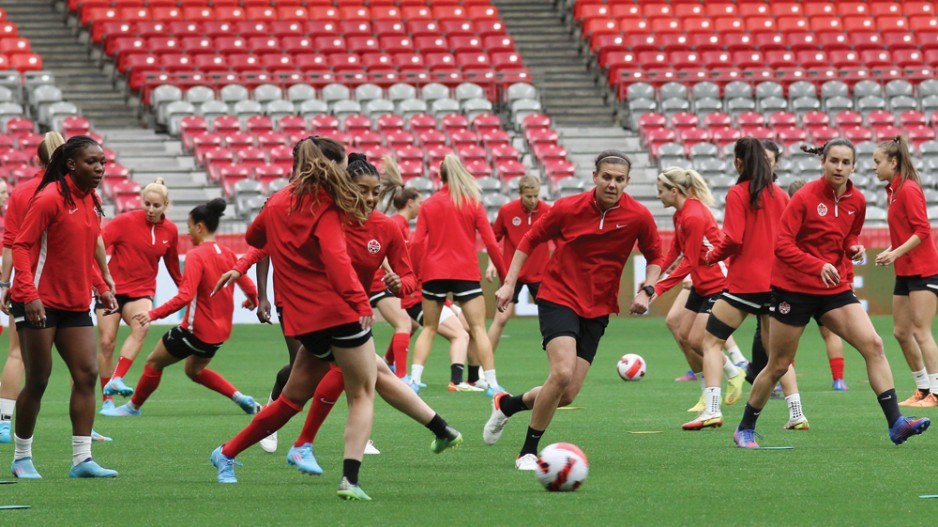The Canadian Soccer Association (CSA) went from a $5.3 million surplus the year the women’s team won Olympic gold, to a $6.3 million loss the year the men’s team returned to the World Cup after a 36-year absence.
Audited financial statements through Dec. 31, 2022, tabled at the annual general meeting on Saturday and published on Monday, show revenue increased 42.5 per cent to $47.6 million. Expenses grew almost 92 per cent to $54 million.
Grants from FIFA and CONCACAF ballooned almost 340 per cent, from $4.2 million in 2021 to $18.46 million in 2022, reflecting the Qatar 2022 appearance payment. However, commercial and other fees fell 11 per cent to $16.1 million.
Revenue from player registration fees increased from $5.03 million in 2021 to $6.6 million in 2022 and grants from taxpayers rose to $5.06 million from $4.7 million.
The biggest cost was $19.5 million for men’s teams, up from $11.03 million year over year. Women’s teams cost $14.03 million, up from $5.1 million.
Staging, marketing and communications expenses grew to $8.04 million from $3.8 million, and administration and meetings rose to $3.8 million from $2.7 million.
CSA revenue and expenses pale in comparison to the United States Soccer Federation (USSF), but the two couldn’t be further apart in terms of transparency.
For instance, in its fiscal 2022 report, the USSF broke down the total $8.17 million revenue it received from registration fees for youth, referee, professional and amateur ranks.
It also showed costs of the senior teams ($26.95 million for the men and $20.4 million for the women), but included the revenue from matches ($41.98 million for national teams and $2.8 million for international matches) and even the value of the Nike sponsorship agreement – $15.1 million in base payments, $1.75 million in equipment and $789,000 in merchandise royalties. USSF even disclosed expenses for the board of directors and committees ($357,380) and costs of the organization’s annual general meeting ($556,478).
The USSF also publishes its Internal Revenue Service filing, which shows executive compensation. Men’s national team coach Gregg Berhalter was the highest-paid at $1.67 million, while CEO William Wilson earned $679,770.
In testimony before a House of Commons committee in February, former national team player and assistant coach Andrea Neil criticized the CSA’s opacity and urged the committee to undertake a “comprehensive forensic audit into Canada Soccer's finances, to publicly disclose how funding is being used, and why, to ensure the mission of the organization is being carried out ethically and effectively."
The CSA’s annual financial report said CSA received $3.2 million from the Canadian Soccer Business LP (CSB) broadcast and sponsorship deal, up from $3.15 million a year earlier. CSA is entitled to receive up to $4 million annually plus other payments in relation to international broadcast rights starting in 2023.
The controversial 2019 agreement runs through 2027, with a CSB option to extend another 10 years. According to notes in the PwC-audited report, CSB is allowed to “retain any and all revenue from any agreement negotiated and/or signed in connection with the representation, including all revenue generated pursuant to sponsorship agreements and broadcasting agreements.”
On Saturday, interim president Charmaine Crooks was elected for one year to finish the four-year term of the February-resigned Nick Bontis. The former International Olympic Committee member, who lives in West Vancouver, defeated Sport 小蓝视频 executive director Rob Newman, the former CSA vice-president who was runner-up in 2012 to Victor Montagliani.
West Vancouverite Montagliani, who endorsed Crooks, became the president of CONCACAF and vice-president of FIFA in 2016.
Last week, Minster of Sport Pascale St-Onge threatened to order an audit of CSA after several current and former players testified before House of Commons committees about abuse and corruption in the organization.
"We have questions about the finances of Soccer Canada,” St-Onge told reporters.
“Canada Soccer’s approach has reflected a culture of secrecy and obstruction,” women’s captain Christine Sinclair said in a March committee appearance.
Vancouver and Toronto are among the 16 host cities for the 2026 men’s World Cup, expected to cost taxpayers at least $520 million.




